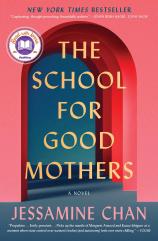The School for Good Mothers
Review
The School for Good Mothers
I’ve had Jessamine Chan’s debut novel, THE SCHOOL FOR GOOD MOTHERS, on my “to-read” list for well over a year, ever since I first started hearing early buzz about this book that was receiving comparisons to Margaret Atwood’s THE HANDMAID’S TALE and Leni Zumas’ RED CLOCKS. So I was pretty excited to finally have the opportunity to dig into this timely novel about motherhood and surveillance, which proved well worth waiting for.
Like most moms, Frida Liu is doing the best she can. In her late 30s, she’s still reeling from her ex-husband Gust’s decision to leave her for a younger woman when their daughter, Harriet, was just an infant. Now Harriet is a toddler, and Frida has structured her whole life around maximizing the time she has with Harriet during her and Gust’s shared custody schedule. Frida works from home so she can spend more time with Harriet, and she has few friends, instead focusing entirely on her job and her daughter.
"I don’t want to give too much of the plot away, but let’s just say there’s a reason why THE SCHOOL FOR GOOD MOTHERS is being compared to other classics of dystopian literature."
But Harriet, like many toddlers, has difficult phases, and during one particularly sleepless and fussy stretch, Frida succumbs to what she repeatedly refers to as her “very bad day.” Realizing that she left some paperwork at her office on campus at the University of Pennsylvania, she leaves Harriet in her apartment alone for what should have been just a few minutes --- but winds up being a couple of hours.
It turns out that Frida’s neighbors were paying attention, and one of them turned her in to the authorities. But in Frida’s world, that doesn’t mean getting a warning from Child Protective Services, or even a referral to mandatory parenting classes. Instead, after a period of electronic surveillance and a series of evaluations, Frida is sentenced to a one-year stint at a rehabilitation facility for mothers who have failed in countless different ways. If Frida can follow the school’s prescriptive curriculum and pass the tests, she might have the option to restore custody of Harriet. But if she falls down on the job (again), her parental rights will be terminated and she’ll lose the opportunity to ever reconnect with her precious child.
Frida’s feelings about the school --- not to mention her white ex’s relationship with his white girlfriend --- are complicated by the fact that she is Chinese American, perhaps the only Asian mom in the program. As she is encouraged to become ever more selfless in her dealings with her child, she is also forced to confront her memories of her own mother, as well as her internalized assumptions about what an Asian mom should be, and her resistance to having her Eurasian daughter now completely divorced from her Chinese heritage.
I don’t want to give too much of the plot away, but let’s just say there’s a reason why THE SCHOOL FOR GOOD MOTHERS is being compared to other classics of dystopian literature. It contains elements of speculative fiction and some seriously creepy technology, beyond the atmosphere of extreme surveillance that seems all too real. Jessamine Chan’s debut will be read and enjoyed by all kinds of audiences. But perhaps the ones who will be most unnerved by its plotlines will be parents, who know that most moms are one step away from a “very bad day” and who might just grow more paranoid about that stranger in the park who gives you side-eye when you lose patience with your preschooler.
Reviewed by Norah Piehl on January 7, 2022
The School for Good Mothers
- Publication Date: February 7, 2023
- Genres: Fiction, Women's Fiction
- Paperback: 336 pages
- Publisher: S&S/Marysue Rucci Books
- ISBN-10: 1982156139
- ISBN-13: 9781982156138




